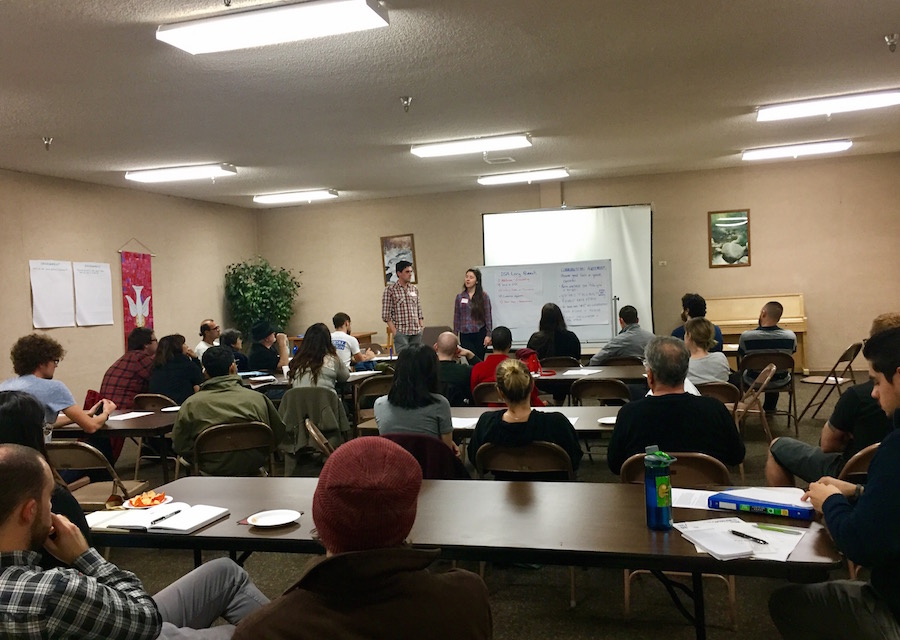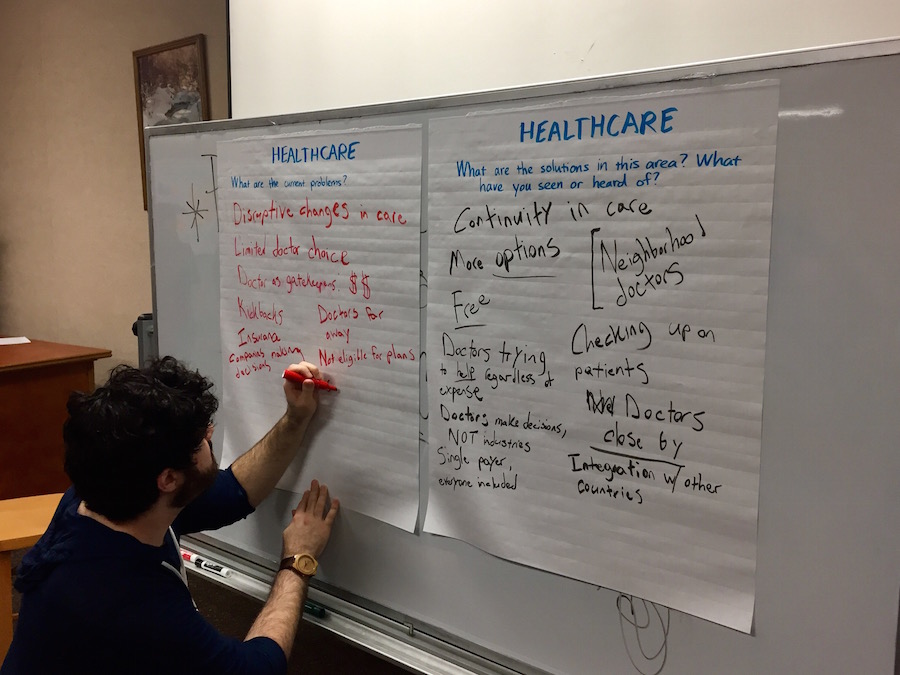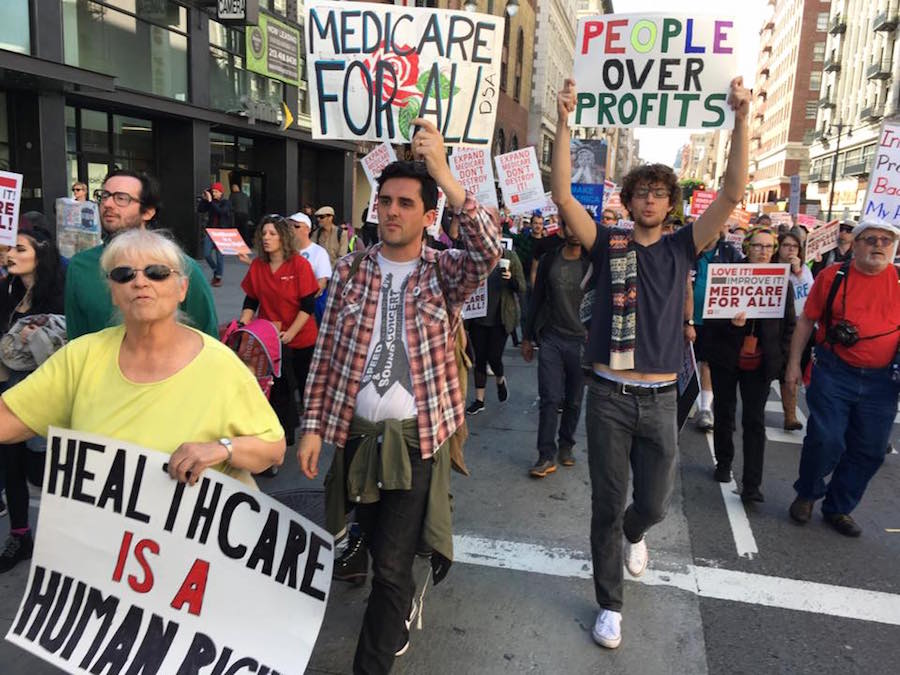
Co-organizers Andrew Guy and Ashley Thomas lead a Democratic Socialists of America Long Beach chapter meeting where they discuss their action strategy. Photos by Jason Ruiz.
As I walked into the The Gathering at First Lutheran Church on Atlantic Avenue and hung a sharp left to the staircase leading to the basement, the soft-yellow tiled floor and choir practice echoing above hardly intimated that I would soon be surrounded by revolutionaries.
It was a Monday night, and tucked under this nondescript place of worship were about 40 people planning the next steps in a revolution that was started by a then-little-known senator from Vermont in April 2015.
Bernie Sanders brought the idea of democratic socialism to the mainstream during his historic rise from long-shot candidate to grass roots phenomenon in the last presidential election cycle. Though his run for the White House ended up being unsuccessful, he proved at least two things: that you can crowdfund a campaign capable of competing with the elite and their wealthy donors, and that the American public has a growing appetite for more progressive policies.
The mercurial growth in memberships for groups like the Democratic Socialists of America (DSA)—its numbers have jumped from about 3,000 members to 17,000 since November—suggests that those Sanders supporters aren’t going anywhere, and they might have some unlikely allies. Chapters have sprung up in predictable liberal strongholds like Los Angeles, Washington, DC and New York City, but the group also boasts a presence in deep red states like Oklahoma, Texas and Mississippi.
The group counts chapters in 36 states including ten in California. Annual memberships to the group range from a reduced student price $20 to a family price or $80 and includes a subscription to the group’s magazine Democratic Left.
Long Beach formed its own DSA chapter earlier this year and I sat in on their second general meeting where snacks—communal, of course—and pleasantries quickly gave way to an ice breaking activity. Not unlike the first day of the semester in a college classroom, it was meant to get people speaking to the comrades sharing table space with them. Unlike that first day in class, though, the prompt was deep.
“I want you to turn to your neighbors and share a story of how capitalism has failed you,” said James Suazo, one of the DSA-Long Beach organizers.
Suazo has spent the past few years organizing and advocating for environmental justice issues mostly on the city’s West Side, where arguably capitalism has failed an entire section half of the city. He noted that as the group does more and more outreach, more and more people realize their needs align with the DSA’s desire to reform.
The idea that capitalism has failed the American public was a notion that Sanders drilled home, so much so that his stump speeches were usually accompanied by thousands of people shouting along to tag-lines about the richest one-tenth of one percent owning 90 percent of the wealth in the United States, and his promise that if elected he would create an economy that would “work for everyone, not just the billionaires.”
The group’s ethos is that the economy and society should be run democratically to meet human needs, not to drive profits to the one percent. That includes a push for more recognizable issues like universal healthcare and free college, but also other issues like affordable childcare, environmental justice and employee protections.
There were no billionaires in this room, and despite an admission by one organizer that DSA has historically been dominated by straight, white men, that night the room was filled with men and women of all ages and ethnicities, most of whom feel disenfranchised and underserved by traditional political parties and are thirsting for change.
DSA organizer Ashley Thomas explained that not everyone knows that they’re a socialist, and that everyone goes through their own self-discovery phase. That’s one of the goals of the group, to cut through the disinformation and conflation with long-held “red scare” ideas about communism that tainted Sanders’ bid for the White House, to maybe signal to people that DSA is for them. The other is to organize and act.
“The United States does not educate people about socialism, and so we’re all still learning and we hope to sort of spread the word,” Thomas said. “The other thing is to get shit done. We actually want to get some wins in the community and do things that are really going to help people in a concrete way.”
The chapter’s leadership is careful not to oversimplify when describing the basic tenets of socialism.
It is true that basic services like police, fire, military, social security and K-12 education are supported by tax dollars and operate very much like the group believes a single-payer health system or free higher education could, and should. But many autocratic regimes have used similar models to abusive ends.
DSA is not a political party, per se, and thus can cast a wider net to draw people in. The crowd at the meeting included current and former registered Democrats, Independents, Marxists and even a Green Party supporter. They explain that they’re less interested in swaying those 130 million people who voted for Trump or Clinton and more intrigued by the over 100 million people who didn’t vote.
Steven Hutchinson, a member of the Los Angeles chapter, agrees with that notion. He cited a Harvard University study put out in April 2016 revealing that 51 percent of those aged 18-29 years rejected capitalism. They were joined by every subgroup polled not over the age of 50 that showed a majority of respondents question free market principles.
Hutchinson said he was first turned on to socialism in the first few years of the Obama administration, during the Occupy movement, but Trump’s election got him to show up “IRL” (in real life). He added that the next four years need to focus on changing the language surrounding socialism and harnessing the populist wave that fueled Sanders’ campaign and ultimately elected Trump.
“It’s going to be generational,” Hutchinson said. “This is the first generation that feels collectively that this system of economics just doesn’t work for them. Never let a crisis go to waste.”
The issues that the Long Beach chapter will pursue—the focus of this particular meeting—will focus on items unique to Long Beach and the local levers that need nudging to put new policies into action. They don’t require an allegiance to the writings of Marx or Trotsky, just a desire to make things better for everyday people.

Jake Moskowitz leads the group in a discussion on problems they see in American healthcare and possible solutions to the issues.
Jake Moskowitz, a co-organizer of the Long Beach chapter said that the group provides a place for both the radical far-left socialists that truly want to seize the means of production, and for more mainstream liberals searching for another option.
He noted that Sanders’ policies were more along the lines of FDR, and despite some of the more radical ideas shared by some of its members, the core values the group holds are aimed at improving the social safety for everyone.
Moskowitz did throw in a spoiler alert: the group has its eyes set on the 2018 midterm elections, a year in which five council seats and the mayorship will be up for grabs in Long Beach.
“If Bernie Sanders were running for president in the 60s he would’ve been considered a Centrist Democrat,” Moskowitz said. “One thing we have to admit is the Democratic Party has steadily inched to the right over the course of 60 or 70 years, a process that has been slow, but because it has been slow nobody has called them out on it. For me, the DSA is a way of calling them out and yanking them back to the left, if it’s possible.”
In Long Beach that will include a push for universal pre-K education and sanctuary city status, something organizers supported when the Long Beach City Council recently voted to support a duo of state bills that could cast California as a “Sanctuary State”.
Other options that were floated around, and will be explored in depth as the group develops sub-committees, include citizen oversight of the Long Beach Police Department, rent control initiatives and an effort to ban fracking in Long Beach and break the city’s dependence on the petroleum industry.
Still in its infant stages, this DSA chapter is feeling out its plan for action. Staying true to the ideals of socialism, the people helped to outline concerns they’d like to see addressed and brainstormed solutions as they rotated around the room two giant sheets of paper dedicated to broad subjects like feminism, the environment, racism, health care and labor needs.
If any city would be open to the rhetoric of socialism it could be Long Beach. Stefan Borst Censullo, a former city employee, current marijuana lawyer, lobbyist and co-organizer of the Long Beach chapter, explains that with the concentration of so many cultures, especially those from Central America and Southeast Asia who may not hold the same reservations regarding socialism as their neighbors that were born here, this city is primed for these ideals.
Borst-Censullo and Thomas represent a faction of the left that subscribed to the Sanders message, those college educated twenty-to-thirty-somethings that were affected by the financial collapse in the mid 2000s. That was how capitalism first failed them, but it took a Trump presidency to spring them into organizing.
Despite Sanders’ loss in the primary season, and Trump’s ascension to the White House, many progressives pointed to small victories in local races as candidates with more populist messages took school board seats and city council positions. To some, that has already happened in Long Beach.
Borst-Censullo counted the election of Jeannine Pearce last year as one of those victories, as she was able to overcome funding gaps and her outsider, pro-labor activists roots to take a seat behind the dais with her more establishment Democrat colleagues.
“She’s been somebody whose policies reflect that of something that socialists would be very accustomed to,” Borst-Censullo said of Pearce. “And that’s because she was out there megaphoning for housekeepers, instrumental in Measure N which was one of the first economic rights campaigns via the ballot. The fact that she showed that you can do that [win] in this city, because we have a lot of people who don’t vote, that was inspiring.”

Andrew Guy (center), co-organizer of the Long Beach chapter, marching in Los Angeles earlier this month at a Medicare for all rally. Photo courtesy of DSA-Long Beach Facebook.
While large ticket items like universal healthcare will have to be settled at the national level, DSA chapters are seeking out change where they can levy it, possibly through endorsing or running their own local candidates, or through work with people who they see as sympathetic to their goals.
If the progressive movement continues, Pearce could be part of the first wave of what could become a steady stream of electeds who are more willing to take up the causes of community groups that have long felt like some of their more pressing needs have been deflected or not addressed deeply enough by the city council.
Pearce, who admits she has not been a lifelong Democrat, said political parties have always frustrated her and that what she really seeks is a government that works smartly and provides a feeling to residents that they can count on it. She did not shy away from the idea that a group of socialists viewed her as someone they could work with.
“To have people who identify as being socialists look to me as an ally, I’m proud of that,” Pearce said. “ I’m proud to have people look to me as an ally, as somebody who can get their message out and help make sure that Long Beach is really a city that is lifting all boats.”
She declined to speculate on what a larger surge of progressive demands could mean for the future of Long Beach politics, especially if the DSA grows to a point where it’s moving election night margins, but said that everyone deserves to have their voice heard and that the political climate of the country will most definitely include those increased demands from constituents to fight for policy changes.
“I believe everyone deserves a seat at the table but how do we make sure that people are talking to each other,” Pearce said. “ When you’ve been an organizer and you’ve sat in people’s living rooms and you’ve heard those stories and you’ve looked into their eyes, you can’t just go to council and ignore that experience.”
There is a lot of optimism that the window of opportunity for the idea of Democratic socialism to take hold is larger than it has ever been.
Town halls in conservative districts have flipped on their sides in recent weeks with Republican lawmakers having to defend calls from their constituents to keep Obamacare in place, something that four years ago would have seemed as odd a concept as a reality television star becoming the Commander in Chief. Many have taken to canceling scheduled town halls to avoid the backlash that some representatives have characterized as paid protestors pushing a leftist agenda.
One woman in Tennessee, who had her exchange with her congressional representative go viral, authored an op-ed in the Washington Post this week taking her stance a step further, advocating for a single-payer system in the style that was advocated by Sanders.
Steve Askin has been part of socialism groups for the better part of four decades, and his impassioned plea for action now drew the largest applause of the night. He said what distinguishes DSA from other sectarian groups on the left is that it’s embedded in the lived reality of working class people.
Askin, a researcher and financial analyst who was part of the contingent of community groups that successfully lobbied the council for a minimum wage increase, said that the group’s common sense policy changes can radically impact working people’s lives. And in a town full of working class individuals and an administration that’s actively pursuing policies that will erode away their chances of advancing out of that class, he believes the time to act is now.
“We have a disastrous moment in this country,” Askin said. “We have a government in power that is putting corporate chieftains into the critical pieces of the American economy. We’re in a moment where the lives of working people and middle class people, our economic future, is at threat… this is the moment where people have to organize.”

